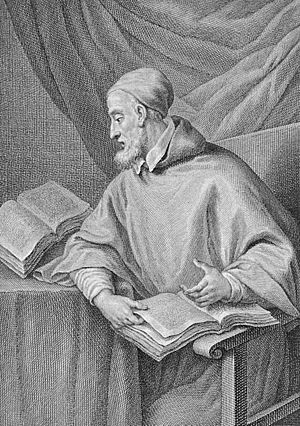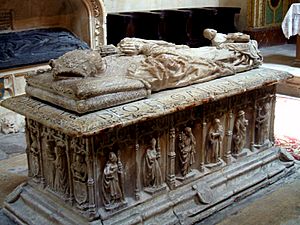Alfonso de Cartagena facts for kids
Alfonso de Santa María de Cartagena (born in Burgos in 1384 – died in Villasandino in 1456) was a very important person in Spain before the Renaissance. He was born Jewish but became a Christian. He served as a Roman Catholic bishop, a diplomat (someone who represents their country), a historian (someone who studies and writes about the past), and a writer.
Contents
Who Was Alfonso de Cartagena?
Alfonso de Cartagena was the second son of Rabbi Paul of Burgos. His father changed from Judaism to Christianity around 1390 or 1391. At the same time, Alfonso, his four brothers, one sister, and two uncles were also baptized.
Alfonso studied law at the University of Salamanca. People said he was a "great lawyer" in both church law and civil law. He worked as a dean in Santiago de Compostela and Segovia. Later, he became a special messenger for the Pope (called an apostolic nuncio) and a church official in Burgos in 1421.
A Statesman and Church Leader
Alfonso was skilled as both a leader in government and a church leader. In 1434, King John II of Castile chose him to represent Castile (a kingdom in Spain) at a big meeting called the Council of Basel. At this meeting, Alfonso gave a famous speech. He argued that the King of Castile had more rights than the King of England.
A famous writer named Enea Silvio Piccolomini, who later became Pope Pius II, said that Cartagena was "an ornament to the prelacy." This means he was a great example for church leaders. Pope Eugenius IV was so impressed by Alfonso's work that he made him the bishop of Burgos in 1435, after Alfonso's father passed away. Pope Eugenius IV even said he felt honored to be in the same room as Alfonso.
His Return to Burgos and Later Life
After living in Rome for a while and studying, Alfonso de Cartagena went back to Burgos. There, he started a public school where many important scholars of his time studied. He was also good friends with another writer, Fernán Pérez de Guzmán. Alfonso dedicated one of his books, Oracional, which was about prayer, to his friend.
Alfonso also traveled to Portugal to help King John II make peace. He was also a messenger to the kings of Germany and Poland. He helped solve problems between Castile and other kingdoms like Aragon and Granada.
He gave a lot of money to help build the monastery of San Pablo of Burgos. He also helped rebuild other churches and monasteries in his area, including the important Cathedral of Burgos.
His Love for Books and Learning
Alfonso de Cartagena loved translating old books into Spanish. In 1422, he translated some works by the Roman writer Cicero. He did this so that people who were interested in these old writings, but weren't scholars, could read them. He also translated works by Seneca the Younger. He believed that these old writings had important lessons for people.
He even had a disagreement with another scholar named Leonardo Bruni about a new translation of a book by Aristotle. This shows how serious he was about getting translations right and sharing knowledge.
Alfonso de Cartagena went on a pilgrimage (a special journey for religious reasons) to Santiago de Compostela when he was 60 years old. He died on his way back to his home area.
What Did Alfonso de Cartagena Write?
Alfonso de Cartagena wrote many important books and translated others.
- Translations: He translated twelve books by Seneca and several works by Cicero.
- History Books: Around 1456, he wrote a history of Spain called Anacephaleosis. This book talked about the history of Spain from ancient times to the kings of Asturias and Castile and León. It was later translated into Spanish as Genealogy of the Kings of Spain.
- Moral and Religious Writings:
* Judica me, Deus: This was a commentary on a psalm from the Bible. * Defensorium fidei (also called Defensorium unitatis christianae): This book, written around 1449–1450, defended Jewish people who had converted to Christianity. * Oracional de Fernán Pérez: Written around 1454, this book was about prayer and was dedicated to his friend Fernán Pérez de Guzmán. * Doctrinal de Caballeros: Written around 1444, this book was for knights. It talked about faith, laws, war, rewards, punishments, and how knights should behave.
- Other Works:
* Memoriales virtutum (or Memorial de virtudes): A book about virtues. * Allegationes... super conquista insularum Canariae: In 1437, he wrote this to argue for Castile's right to control the Canary Islands. * Epistula... ad comitem de Haro: Around 1440, he wrote this letter suggesting books for noble people to read to become educated. * Duodenarium: In 1442, he answered twelve questions from his friend Pérez de Guzmán in this book. * Tractatus questionis ortolanus: Written between 1443 and 1447, this book argued that sight was better than hearing.
See also
 In Spanish: Alfonso de Cartagena para niños
In Spanish: Alfonso de Cartagena para niños
 | Roy Wilkins |
 | John Lewis |
 | Linda Carol Brown |



